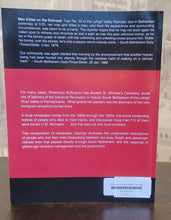Due to the nature of shipping delays out of our control, NMIH cannot guarantee transit times or delivery dates.
The Steel Industry played a central role in the United States post-World War II economic success and social contract. In tandem with the Great Recession, a new capitalism - in which banks and the credit system took precedence over industrial production - changed the lives of American workers, including steelworkers. As Goes Bethlehem raises important questions about why workers and unions were unable to contest this attack, instead navigating a long downward trajectory.
Through steelworkers' experiences and reflections, Jill Schennum demonstrates the significance of industrial work to people's lives, identities, and sense of worth. She covers thirty-five years of investment and disinvestment , managerial initiatives, transfer decisions, the eventual bankruptcy of the Bethlehem Steel Corporation, and workers' movement into retirement, unemployment, and new postindustrial jobs. Schennum also explores the divides of race, ethnicity, gender, and region and how these fractures were mobilized to undermine working-class strength.




